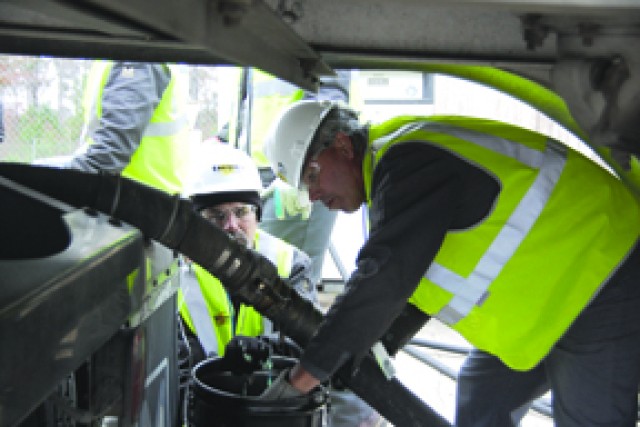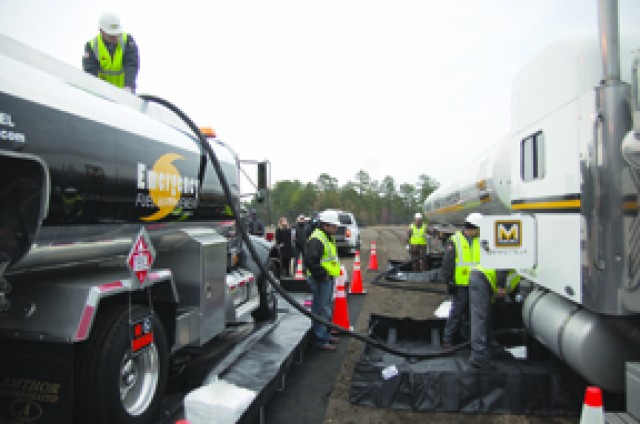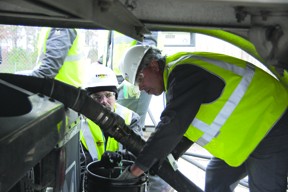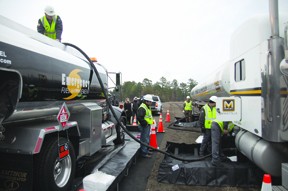FORT POLK, La. -- When a disaster occurs, one of the first items needed to ensure a rapid recovery is fuel. Whether it's law enforcement, rescuers or other emergency officials, without fuel to reach those who are in danger, the effect of a disaster is magnified.
To test a local contractor's ability to transport fuel in the event of a presidential-declared emergency, representatives from the U.S. Army's Defense Energy Support Center at Fort Belvoir, Va., paid a visit to Fort Polk Dec. 1.
"We do this on a semi-annual basis," said Anthony Thomas with ADESC. "It's a 'proof of concept' exercise where we make sure the contractor has the right equipment and can do what we need them do."
In this case, it was a subcontractor who was tested. Macro Companies' Emergency Fuel Management Division, who subcontracts from Foster Fuels, was put on the clock Nov. 30 that they would be required to move 5,000 gallons of diesel fuel from their headquarters in Broussard, outside of Lafayette, to Fort Polk, Thomas said.
"The exercise was activated by FEMA (Federal Emergency Management Agency)," Thomas said. "They are one of our customers and we have an MOU (memorandum of understanding) to provide ground fuel in support of emergency vehicles."
Thomas said that during an emergency, such as a hurricane, FEMA would contact his office with a request for fuel. At that time a distribution site would be set up, such as Fort Polk, the contractor contacted and fuel delivered. "It made sense to conduct this exercise on Fort Polk because Macro is already under contract to deliver fuel to Fort Polk," Thomas said. "While they make this delivery, we'll test truck-to-truck and gas can transfers. We'll also look at fuel accountability, fuel quality and environmental issues."
With machine gun fire on Fort Polk's ranges and high-flying Air Force jets serving as a backdrop, Macro workers began setting up a berm on the large staging area across from Alligator Lake to provide an environmentally safe area to begin their truck-to-truck transfer. Once the berm was established, Macro's workers completed a transfer of more than 300 gallons of fuel from one truck to another.
"We have a checklist that we go by," said FEMA's Rob Hill. "We look at the process and make sure everything goes according to what we require."
Thomas said it's important that those being tested know what they are doing for two reasons.
"First, there's the safety and environmental impact to consider," Thomas said. "Secondly, if they fail, they won't get paid. Their contract is performance based."
After the truck-to-truck and truck-to-can transfers, Macro drivers moved their trucks to the North Fort Bulk Fuel Storage Area on Fort Polk where the Macro team demonstrated its ability to transfer 5,000 gallons of fuel to the post's diesel storage tank. Before the transfer, Mona Myers and Robert Eckhoff with Northrup Grumman checked the fuel to see if it had been contaminated with water.
"We also take a fuel sample and send it to our lab in Pennsylvania for testing," Myers said.
Once the fuel transfer was complete, the exercise was finished. Thomas said the Macro team performed well. "It's another success story," Thomas said. "We're ready for next year. We'll do one in the spring before hurricane season starts."




Social Sharing